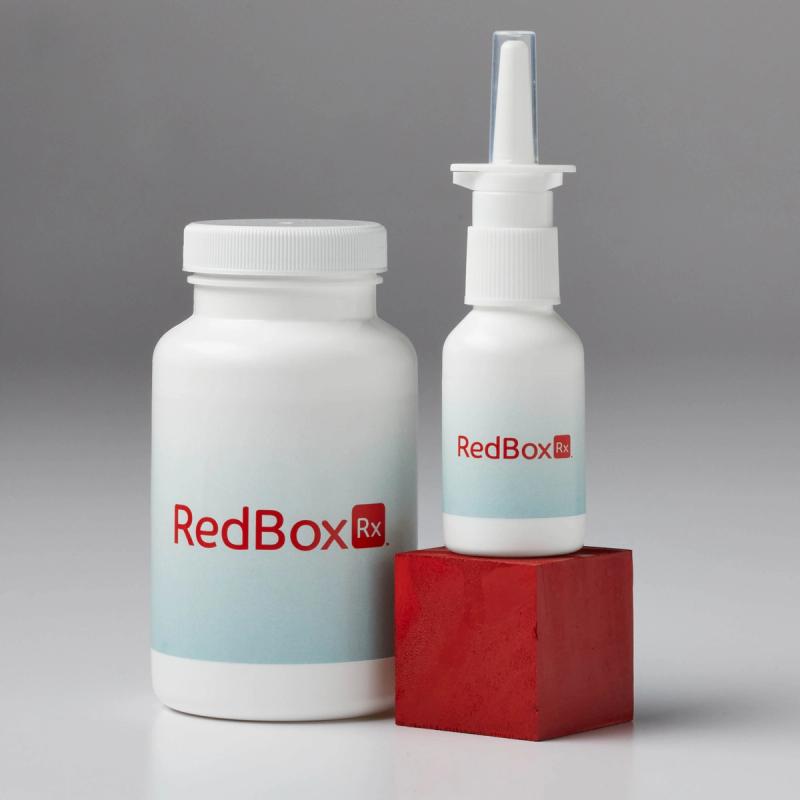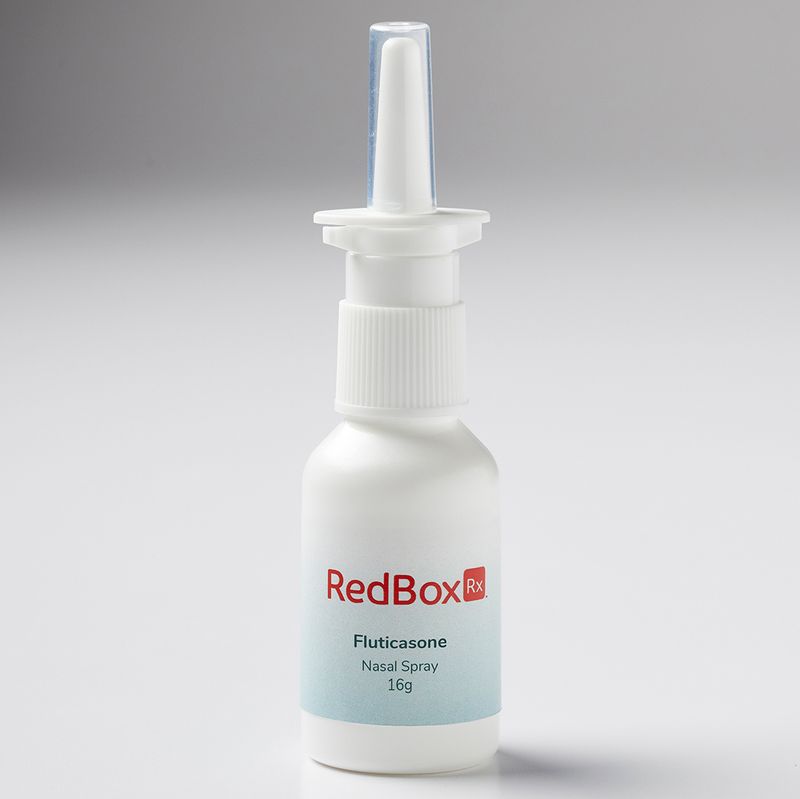Fluticasone Nasal Spray FAQs
-
Fluticasone nasal spray is used to relieve symptoms of rhinitis such as sneezing and a runny, stuffy, or itchy nose and itchy, watery eyes caused by hay fever or other allergies (caused by an allergy to pollen, mold, dust, or pets). Fluticasone is in a class of medications called corticosteroids. It works by blocking the release of certain natural substances that cause allergy symptoms.
-
Fluticasone comes as a liquid to spray in the nose. When fluticasone nasal spray is used to relieve hay fever, and other allergy symptoms, or nonallergic rhinitis, it is usually sprayed in each nostril once daily. Alternatively, fluticasone nasal spray is sometimes sprayed in each nostril twice daily (in the morning and evening) at a lower dose as recommended by your doctor. Follow the directions on your prescription or product label carefully, and ask your doctor or pharmacist to explain any part you do not understand. Use fluticasone exactly as directed. Do not use more or less of it or use it more often than directed on the package label or prescribed by your doctor.
Fluticasone nasal spray is only for use in the nose. Do not swallow the nasal spray and be careful not to spray it into your eyes or mouth.
Each bottle of fluticasone nasal spray should only be used by one person. Do not share fluticasone nasal spray because this may spread germs.
Fluticasone nasal spray controls the symptoms of hay fever, allergies, nonallergic rhinitis, or nasal polyps, but does not cure these conditions. Fluticasone works best when used regularly. Use fluticasone on a regular schedule unless your doctor has told you to use it as needed. Call your doctor if your symptoms get worse or do not improve after you use nonprescription fluticasone nasal spray daily for 1 week.
Before you use fluticasone nasal spray for the first time, read the written directions that come with it. Ask your doctor or pharmacist if you have any questions about how to use the nasal spray.
-
Before using fluticasone nasal spray,
tell your doctor and pharmacist if you are allergic to fluticasone, any other medications, or any of the ingredients in fluticasone nasal spray. Check the package label or ask your pharmacist for a list of the ingredients.
tell your doctor and pharmacist what prescription and nonprescription medications, vitamins, nutritional supplements, and herbal products you are taking, or have recently taken, or plan to take. Be sure to mention any of the following: clarithromycin (Biaxin, in PrevPac); an antifungal such as itraconazole (Onmel, Sporanox), ketoconazole (Extina, Nizoral, Xolegel), or voriconazole (Vfend); conivaptan (Vaprisol); and an HIV protease inhibitor such as atazanavir (Reyataz), indinavir (Crixivan), lopinavir (in Kaletra), nelfinavir (Viracept), ritonavir (Norvir, in Kaletra), or saquinavir (Fortovase, Invirase); and nefazodone. Also tell your doctor and pharmacist if you are using steroid medications such as dexamethasone, methylprednisolone (Medrol), and prednisone (Rayos) for asthma, allergies, a rash, or an eye condition. Your doctor may need to change the doses of your medications or monitor you carefully for side effects.
tell your doctor if you have recently had surgery on your nose, or injured your nose in any way, or if you have sores in your nose, if you have or have ever had cataracts (clouding of the lens of the eye), glaucoma (an eye disease), asthma (sudden episodes of wheezing, shortness of breath, and trouble breathing), any type of infection, or a herpes infection of the eye (an infection that causes a sore on the eyelid or eye surface). Also tell your doctor if you have chicken pox, measles, or tuberculosis (TB; a type of lung infection), or if you have been around someone who has one of these conditions.
tell your doctor if you are pregnant, plan to become pregnant, or are breastfeeding. If you become pregnant while using fluticasone, call your doctor.
-
Unless your doctor tells you otherwise, continue your normal diet.
-
Use the missed dose as soon as you remember it. However, if it is almost time for the next dose, skip the missed dose and continue your regular dosing schedule. Do not use a double dose to make up for a missed one.
-
Fluticasone nasal spray may cause side effects. Tell your doctor if any of these symptoms are severe or do not go away:
headache
dryness, stinging, burning or irritation in the nose
nausea
vomiting
diarrhea
bloody mucus in nose
dizziness
Some side effects can be serious. If you experience any of these symptoms, stop using fluticasone nasal spray and call your doctor or get emergency medical treatment:
severe face pain
thick nasal discharge
fever, sore throat, chills, cough, and other signs of infection
whistling sound from the nose
hives
rash
itching
swelling of the face, throat, tongue, lips, eyes, hands, feet, ankles, or lower legs
hoarseness
difficulty breathing or swallowing
wheezing
feeling faint
severe or frequent nosebleeds
Fluticasone may increase the risk that you will develop glaucoma or cataracts. You will probably need to have regular eye exams during your treatment with fluticasone. Tell your doctor if you have any of the following: pain, redness, or discomfort of the eyes; blurred vision; seeing halos or bright colors around lights; or any other changes in vision. Talk to your doctor about the risks of using this medication.
Fluticasone nasal spray may cause other side effects. Call your doctor if you have any unusual problems while using this medication.
If you experience a serious side effect, you or your doctor may send a report to the Food and Drug Administration's (FDA) MedWatch Adverse Event Reporting program online (http://www.fda.gov/Safety/MedWatch) or by phone (1-800-332-1088).
-
Keep this medication in the container it came in, tightly closed, and out of reach of children. Store it at room temperature and away from excess light, heat and moisture (not in the bathroom).
It is important to keep all medication out of sight and reach of children as many containers (such as weekly pill minders and those for eye drops, creams, patches, and inhalers) are not child-resistant and young children can open them easily. To protect young children from poisoning, always lock safety caps and immediately place the medication in a safe location - one that is up and away and out of their sight and reach. http://www.upandaway.org
Unneeded medications should be disposed of in special ways to ensure that pets, children, and other people cannot consume them. However, you should not flush this medication down the toilet. Instead, the best way to dispose of your medication is through a medicine take-back program. Talk to your pharmacist or contact your local garbage/recycling department to learn about take-back programs in your community. See the FDA's Safe Disposal of Medicines website (http://goo.gl/c4Rm4p) for more information if you do not have access to a take-back program.
-
If someone swallows fluticasone nasal spray, call your local poison control center at 1-800-222-1222. If the victim has collapsed or is not breathing, call local emergency services at 911.
-
It is important for you to keep a written list of all of the prescription and nonprescription (over-the-counter) medicines you are taking, as well as any products such as vitamins, minerals, or other dietary supplements. You should bring this list with you each time you visit a doctor or if you are admitted to a hospital. It is also important information to carry with you in case of emergencies.
-
Flonase® Nasal Spray
-
We offer a variety of prescription medication options for allergies including:

Get fluticasone nasal spray online.
Treating allergy or sinus infection symptoms has never been easier. RedBox Rx offers convenient and affordable treatment, with a no-wait online doctor consultation. Get prescription medications delivered to your door or select pickup at your local pharmacy.
- Low-cost telehealth consult with a licensed medical provider.
- Fluticasone nasal spray starting at $19 per month.
- Confidential, private and secure.
- Free standard shipping or expedited/overnight available.
Sorry, we’re closed for today. Our U.S. licensed medical providers are available daily 7 a.m. to 9 p.m. CST via live video visit. We look forward to serving you soon. Email us anytime at [email protected].


